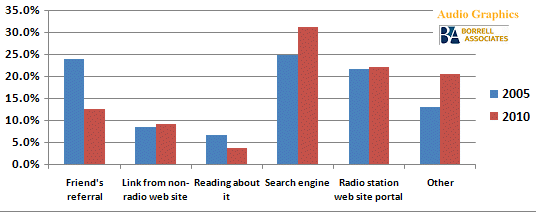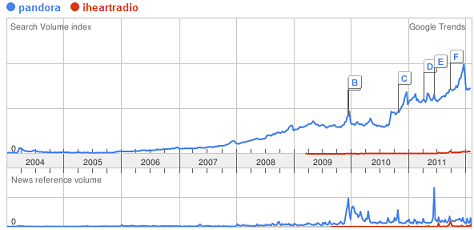 Analytics, Metrics and Music for the Radio Industry
Analytics, Metrics and Music for the Radio Industry
 An Indie Artist Pipeline to Internet Radio
An Indie Artist Pipeline to Internet Radio
 Radio Industry ROI Strategy
Radio Industry ROI Strategy
 A New Breed of Indie Artists
A New Breed of Indie Artists
It Hurts to Believe Your Own Hype
There's a misnomer that's been wrapped around the radio industry since consolidation; "Say it, and it must be true."
"Increasing the stations owned by a single group brings operational efficiencies" hasn't proven true. "Voice-tracking major market talent through medium and small markets will improve programs" is an unproven guess, too, as is "iHeartRadio will give Pandora a run for its money." What follows is a closer look at this last postulate.
| "Step away from the Clear Channel broadcasts, or Inside Radio headlines and you'll get a sense for how quickly iHeartRadio evaporates. " |
There have been many words recently printed about iHeartRadio. Many talk about how other companies are wising up to the deal offered them, to carry the second-company's stations on the iHeartRadio app. Exclusivity of listing is something that was not so evident until late. I'm not sure about your view, but the short bit of research that I've done shows any radio group or station jumping on-board the iHeartRadio bandwagon risks sliding into online oblivion, sans over-the-air mentions. |
Those who live, eat, and breathe radio read the radio industry trades. There, the name iHeartRadio seems to show up daily.
If you are a Clear Channel employee, and read that company-owned trade - Inside Radio - you'd think this whole iHeartRadio venture was the next generation of radio. Here's what the headline at the IR web site read on Thursday, February 2, 2012: Analyst: Cumulus smart to join iHeartRadio. Underneath were these words: New research shows that nearly eight-in-ten people who say they’re tuning into less broadcast radio cite the inability to personalize content for their change in habit. That has one Wall Street analyst concluding that stations jumping onto the iHeartRadio platform are making the right choice.
Today's Inside Radio headline reads: "iHeartRadio driving local listening contests." The short clip on its home page follows with Clear Channel radio stations have invested enormous amounts of airtime promoting iHeartRadio. After pushing listeners to the web, the online music site is starting to reciprocate. It sounds impressive. But, how much of it is hype vs. reality?
Here's a little exercise that lets you see how much headway the radio industry is making online and, in particular, whether iHeartRadio is more than just a mention every 15 minutes on Clear Channel radio stations. This test revolves around how most people find their music/radio online, as shown multiple times in Audio Graphics surveys of online radio listeners; search engines lead more people to internet radio stations than any other mode of communications.

Knowing this, take a quick spin through Google and scan the listings of searches for the keywords.

 "radio stations"
"radio stations"
 "internet radio stations"
"internet radio stations"
 "music on radio"
"music on radio"
 "music radio stations"
"music radio stations"
 "listing of radio stations"
"listing of radio stations"Hint: Make sure you are signed out of your Google account, so your previous searches don't influence the current returns - especially if you are a Clear Channel employee.
Out of the top 100 returns, here's how iHeartRadio shows up for the term:
 Radio Stations - at #44
Radio Stations - at #44 Internet Radio Stations - not listed
Internet Radio Stations - not listed Music on Radio - at #87
Music on Radio - at #87 Music Radio Stations - - at #50
Music Radio Stations - - at #50 Listing of Radio Stations - not listed
Listing of Radio Stations - not listedFor a little variation, let's also try the keywords "rock radio stations," and "country radio stations."
Besides the paid ads, and the numbers above, "iheartRadio" only comes up as a side-mention under the headings of Clear Channel owned stations a total of 10 times for these last two combined searches. To demonstrate, under the return for "K102 - Minnesota's Country Station," the words read "K102 is Minnesota's Country Station featuring Country radio live from Minneapolis, Mn at k102.com. ... iHeartRadio· Free Live and Custom Radio ..." Do a search for "K102 - Minnesota's Country Station," and iHeartRadio is not mentioned.
You can do a deeper dig by using the Google AdWords Keyword tool. On it type "radio stations" or "music online," then scan the returns for additional keywords and try finding iHeartRadio.
Next let's look at the Google Trends page, where you see a comparison between iHeartRadio with any chosen keyword (or brand). This graph represents how it stands against Pandora, the Bob Pittman-labeled "feature" that most haunts Clear Channel's dominance online. Pandora ranks in the # 5, 3, 5, and 1 slot (respectively) for the above keywords. It is not returned under a search for "Listing of Radio Stations."

We're having this discussion now because there's been a flurry of headlines about stations joining the iHeartRadio lineup, and a couple of stories about some stations refusing. Some of the latter is apparently due to a clause in the iHeartRadio agreement that gives it exclusive rights to list the joining station(s) online.
Any station that signs away the rights to list at other well-known radio portals, so it can be listed among the 1,200+ stations at iHeartRadio, needs to seriously consider the ramifications of this action. Given the number of radio portals that overshadow iHeartRadio in search returns, your chances of being found through a search is seriously diminished.
Step away from the Clear Channel broadcasts, or Inside Radio headlines, and you'll get a sense for how quickly iHeartRadio evaporates.
Since its unrelenting promotion started in September, let's take a look at data that suggests we're seeing a drop in two key performance indicators despite a growing number of people trying iHeartRadio.
1) Clear Channel Stations - Triton Digital Webcast Metrics 2) The percentage of "Active Sessions" to "Session Starts"  3) A 24.5% drop in Time Spent Listening to Clear Channel's Streams.  |
(Download a Free Audio Graphics report on Triton Digital December Webcast Metrics)
We can believe our own hype, or begin looking at the numbers and have them give us a picture of the online radio landscape. I choose the latter because (as was once told to me) the numbers don't lie and they contain no emotion.
Our radio industry is at a precarious time, when it's awoken to the potential of losing dashboard real estate to this new trend in listening to digital music in the car. (You can call it "radio" if you want, but you'll find that this term is more prevalent in the radio industry than in the lives of consumers.)
To reign yourself in even more by limiting the amount of exposure you may receive, online to one company's radio portal - and ignore the multiple radio station portals that consistently show in the top ten - is maintaining the same myopic approach which has kept the radio industry two-steps back since chasing Mark Cuban's "Broadcast.com."
Just because you have Clear Channel saying iHeartRadio is a powerful tool, the on-ramp for broadcasters to the internet, doesn't make it so.
Be careful about getting caught up in hype. The exclusivity clause offered to new iHeartRadio stations may turn out to be more a shackle for acquiring, than a bridge to exposure.
You can say it all you want but, online, while your site may be built, you don't necessarily exist unless consumers and search engines acknowledge you too. (Check this Wordcloud example, I explained last year.) iHeartRadio could well prove to be a flash in the pan like many internet flame-outs. Then, where does that leave all those stations and groups who signed its agreement?
Jumping on this app may prove to generate more hype than exposure.
(One Final Note: iHeartRadio does not appear among the "Top 15 Most Popular Music Websites | February 2012.")








